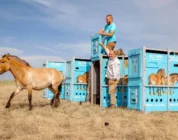When 25-year-old Fatima thinks back to her old life in Syria, it’s almost impossible to believe that her happy, simple, comfortable life would eventually turn into one of such hardship and daily struggle. She could never have imagined that she and her family would one day be refugees.
Fatima is one of thousands of people who fled the ongoing civil war in Syria with the hopes of building new lives in a new country. But hope, for Fatima and her family, quickly turned into hopelessness when their new life in Lebanon became a nightmare of unemployment, loss and near homelessness.
From a war-torn home to a poverty-stricken new life
Their trouble began in the spring of 2011, when Fatima and her now-husband Amer fled with their families to Lebanon. From the beginning, they struggled to make a life for themselves in their new land. As a refugee, Amer wasn’t legally allowed to work in Lebanon, and he spent his days either unemployed or doing work without a permit – something that is incredibly risky and dangerous.
Finding housing was almost impossible, and eventually the couple – now married and with a small child – were forced to move into a neglected, rundown apartment block in north Lebanon. Often, they had no water or electricity, and they battled to buy food and other basic necessities. Unbelievably, this was still better than dodging sniper bullets on the way to university classes – something Amer had done daily in Syria.
Then, the worst possible thing happened when one day in March 2017 a fire swept through the apartment, robbing them of almost everything they had.
The fire was devastating. “Everything was burned,” Amer told the New York Times, explaining that it was caused by a household heater. On introspection, Amer believes the heater malfunctioned because he couldn’t afford to buy the right type of fuel it needed, and had been using a cheaper kind instead.
A reprieve for the struggling refugee family
Finally, things started to look up for the family: they were given the opportunity to move to Belfast, Northern Ireland, and obtain legal residency there. The young family was among just 3% of Syrian refugees selected for relocation to a new country.
While things were looking up, the move was not without its challenges. The family was unable to speak English, and integrating into their new English-speaking country, as well as trying to find work, was going to be extremely challenging.
Fatima’s fast track to English proficiency – and employment opportunities
Fatima was determined to make their new lives a success and lift her family out of poverty. She enrolled in Maximpact’s Online English for Refugees and Migrants course, which forms part of our Fast Track to Employment programme. Fatima excelled.
“It was very useful for my situation because I can’t go to college – and the reason is that I care for my daughter. So, this course was fantastic for me. I’d love to do another online English course if possible.”
http://maximpactblog.com/wp-content/uploads/2019/05/maxipact-Fatima.m4a
The Online English for Refugees and Migrants course gave Fatima the skills she needed to enter the job market in Belfast and after careful thought she has decided to go back to hairdressing on a part-time basis so she can still care for her little girl.
Why Maximpact’s English courses are so effective
Maximpact’s classes are designed around the needs of the refugees and migrants taking the classes – not the other way around. This means that they consider students’ limited time, transport issues, childcare needs and more.
For example, class schedules don’t clash with students’ administrative appointments, or other classes, like driving lessons, that they may be taking. They also provide time for childcare, prayer and so on.
Other ways Maximpact’s courses are different:
- All class participants are on the same level, so no one feels rushed or frustrated with the pace of learning.
- Students learn faster, because the classes are smaller in size and run 2 -3 times a week.
- Online learning means that students can learn from home or anywhere – they don’t have to worry about transport, childcare or the cost and time it takes to get to class.
- Online learning makes it easy for students with disabilities or health issues to attend. We have even had one of our current students resuming class just one day after giving birth to her daughter – such is her desire to improve English!
Read more about our Fast Track to Employment Programme here.
Our classes are more essential than ever – but we need YOUR help
Due to the popularity of Maximpact’s online English courses, refugees have started to contact us directly asking to take classes online. We try our best to place them in programmes funded by the Northern Ireland Department for the Economy, but many will have to wait until more programmes become available. Until then, the need for our courses – and the number of people waiting – continues to grow. There is also an increasing demand for women-only classes.
If you are an organisation, foundation or philanthropist wishing to fund a group of eight refugees for our online English for social integration and employment programme, please contact us on [email protected]. Your organisation can help people like Fatima, and so many others, to have a second chance at a safe, happy and successful life.


